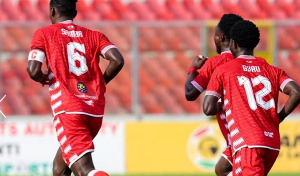Gillian O'Connor and Joel Kibazo explain the latest twist to the plot in the bid for the Ghanaian goldminer
The battle for Ashanti, the embattled Ghanaian goldminer, is turning into a scrum. The four leading players - Ashanti, Lonmin (the mining rump of Tiny Rowland's conglomerate Lonrho), the Ghanaian government and the banks to which Ashanti owes money - are all jostling for position.
And while the Ghanaian government continues to recruit actors to the drama by inviting other miners and financiers to join its team, ordinary shareholders are stuck on the sidelines.
Between them Lonmin and the Ghanaian government own 52 per cent of Ashanti; and because the company is run outside the UK it does not come under the UK Takeover Code.
In the early stages of the battle, Ashanti's cash crisis was what mattered: it was struggling to avoid being pushed into default.
Now it is a fight for control of the company - and in particular its giant Ghanaian mine, Obuasi.
Ashanti has gold mines or mining concessions in Ghana, Guinea, Zimbabwe and Tanzania worth about $2bn with the gold price at $303 an ounce.
Its biggest is the century-old Obuasi mine in Ghana, and its most promising is the Geita deposit in Tanzania, Africa's new El Dorado. The company was semi-nationalised in 1968 and semi-privatised in 1994.
Under Sam Jonah, its charismatic Ghanaian chief executive who was a proteg? of Tiny Rowland, it has found a welcome in many other African countries.
But Ashanti is not an independent agent; it has no less than three would-be puppetmasters.
Lonrho owned it all before nationalisation, and Lonmin still owns a third of the equity.
There are cross directorships and Sam Jonah is still paid by Lonmin: Ashanti pays Lonmin a $1m (?600,000) fee for services which include Jonah's.
The Ghanaian government owns 20 per cent of the equity plus a golden share which gives it a veto.
And now the company's bankers, headed by Goldman Sachs, are pulling a third set of strings.
Ashanti and Lonmin started discussing a merger late last year, but have consistently failed to get Ghanaian government approval. Lonmin is probably still the Ashanti directors' partner of choice, though by now they may well be more concerned about the company's survival and their own jobs.
Lonmin is what is left of Tiny Rowland's sprawling African conglomerate, after all the non-mining bits have been sold off.
It wants either to buy the rest of Ashanti or to sell the remaining stake at a good price. It could then use the money to try to buy in the 27 per cent minority stake in its platinum division held by rival Impala.
Its bid - an all-share offer which it reduced to 16 for 27 (plus 0.1 of an additional Lonmin share or $1 if the gold price stays above $325 an ounce) earlier this week - is worth about $6 an Ashanti share with Lonmin shares standing at about 615p.
The bid is conditional on the approval of the Ghanaian government and a permanent standstill on hedging claims by the bankers.
Sir John Craven, Lonmin chairman and a merchant banker, and Nicholas Morrell, chief executive, made a tactical mistake in not going to talk to the Ghanaian government before bidding - a slip that Tiny Rowland would never have made.
And this week they belatedly dashed off to Accra to rebuild bridges.
Craven and Morrell want a bargain. Craven explained this week that Lonmin's bid is pitched low because of Ashanti's liquidity problems; without them it should be worth nearer $10 a share. If anyone else bids that sort of sum for Ashanti, Lonmin would seriously consider the offer.
Lonmin thinks that since it has the biggest shareholding, and is the only company which has actually made a bid, it can call the shots.
Other people reckon it has overplayed its hand, made too low a bid, and alienated the Ghanaian government.
The government regards Obuasi as a national treasure - gold is a significant foreign exchange earner and Ashanti accounts for 64 per cent of the Accra stock market.
President Jerry Rawlings, who steps down in December 2000, also sees Sam Jonah as a political threat.
The government has been stung into action by the financial mess at Ashanti, for which it blames the management, and by the way both Ashanti and Lonmin seemed to have taken it for granted.
It may have only a 20 per cent equity stake in Ashanti, but the golden share gives it a veto on unacceptable plans for the company's future. A Ghanaian government has already nationalised the company once; the current one could do so again if sufficiently provoked.
It can at least use the implicit threat as a nuclear deterrent in negotiations. The mines, after all, are healthy enough; it is the company that has liquidity problems.
The government is determined to show that it is in control. Its new team of advisers has been telephoning around, stirring up interest among financiers and other gold mining companies.
It has also asked Ashanti's bankers for a three-week standstill in which to work out a plan for the company's future.
It wants to secure Obuasi for the nation. It would probably be prepared to sell off Geita to the highest bidder if necessary. What financial and corporate structure it will suggest for Ashanti is not clear; but there is no doubt about the strength of its negotiating position.
The banks' power over Ashanti's future rests on its indebtedness to them. The lenders could choose not to renew the $270m revolving credit, and would have first claim on the proceeds of a Geita sale, unless Ashanti suddenly acquired the money to pay them off.
The influence of the bankers, who sold the company its derivative instruments, waxes and wanes with the gold price.
This week the hedge book's negative value is believed to have dropped from a peak of $570m to about $330m (with the gold price down to $303 an ounce), bringing the bankers' right to call for cash deposits down to about $30m - for the time being.
Yet the banks have nothing to gain by precipitating an unnecessary crisis. If they pushed Ashanti over the edge, the gold price could well go berserk again. Some bullion banks are believed already to have incurred substantial losses, and the Bank of England would probably like to avoid fresh drama.
Some bankers argue that Lonmin's "rescue" offer benefits only Lonmin.
They are keen to improve the hedge book terms (getting rid of the margin constraints) which would remove the excuse for ungenerous bid terms, and encourage other suitors. They want to help their customer survive and thrive - and get some reward for their trouble. Their obvious ally now is the Ghanaian government.
Other bankers may be under pressure from their superiors to get things sorted.
Goldman Sachs may not be a significant player but its influence has been far-reaching.
It was a famed gold bear when the price was falling earlier this year, and is both Ashanti's adviser and its largest hedge book creditor.
Others have been summoned to the fray by the Ghanaian government's advisers. Prince Al-Waleed Bin Talal Bin Abdulaziz Al Saud, the Saudi Arabian investor, has expressed an interest in Ashanti to the Ghanaian authorities. Prince Al-Waleed has made several investments in Africa in the past two years. He already has a holding in CAL Merchant Bank in Ghana, one of the government's advisers, and he was among the suitors for Lonrho's hotels business, eventually sold to Canadian Pacific. He is reputed to have several billion dollars and an eye for a bargain.
Three large gold mining companies, Canadian Placer Dome, and two South Africans, Anglogold and Gold Fields, have confirmed a provisional interest in Ashanti, or any assets it may consider selling.
Placer, which already has a large joint development with a South African company, is rumoured to be keenest. But all three have emphasised that it is very early days: they are always interested if assets of this quality might be up for sale. They are likely to be particularly interested in the Tanzanian Geita development.
Barrick, another Canadian goldminer, has not officially admitted to an interest in Ashanti.
But it did chose last week to announce that it is spending $280m on developing Bulyanhulu, its existing Tanzanian site.
What next? Probably a lull while the banks give the Ghanaian government time to patch together a plan for Ashanti's future.
Its publicity machine will no doubt keep throwing out names of potential backers, drawing more miners on a trip to Accra.
But do not necessarily expect more public offers for Ashanti meanwhile.
This is the kind of auction where you put your best offer in a sealed envelope and hand it to the auctioneer.
? Copyright The Financial Times Limited 1999. "FT" and "Financial Times" are trademarks of The Financial Times
General News of Saturday, 23 October 1999
Source: THE FINANCIAL TIMES
Stage fills with actors as Ashanti drama continues
Entertainment











